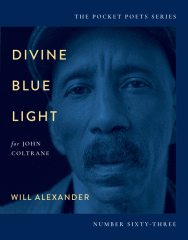
Will Alexander, Divine Blue Light,
City Lights, 2022.
ISBN: 978-0-87286-870-0. 150pp. $16.95.
Will Alexander’s poem, “A Blaze of Riddles,” which comes early on in this cryptic collection, reads:
Because the Sun exudes a blaze of riddles
there exists a haze of optimal osmosis
of protracted helium that bends
via its forceless gruel
via its maniacal translocation
to alien ravines
to other places & possibilities anterior to the sense of chronicle as
uninhabited or pure activity
Indeed, Alexander is all about mysterious riddles – unraveling the riddles of outer and inner space while writing in conundrums himself, trafficking in enigmas. The Sun as object and metaphor recurs throughout the forty-five poems that make up Divine Blue Light, central as symbol to the mystery of existence. Poet and translator Jeffrey Yang, an editor at New Directions Publishing, succinctly describes Alexander’s poems as “meteoric,” an “engagement with the infinite streams of the heart of being.”
“Cartography” is a vital concept throughout these poems, mapping
the universe, mapping internal being, charting consciousness, tracing sound. “Neo-Rulership” alludes to “referential ideation / burgeoning as cartographic plenums,” diagramming the riddle of
existence. Alexander regards his “spectral condition,” “anterior quality magically sculpted out of nothingness,” as he maps reality writ large. “Anterior Cartography,” a four-page poem that
follows, continues the mystical speculation, and in the title poem, “Divine Blue Light: Sudden Ungraspable Nomadics,” a poem addressed to the American jazz saxophonist and bandleader John Coltrane,
he writes “I hear the mesmerizing waltz of Chim Chim Cheree / & the hypnotic parallels of itself as cartographical phantom / being sub-consistent with its own
field of broken micro-boundaries.” “Chim Chim Cheree,” of course, is the familiar song from the musical, Mary Poppins that brings to mind Coltrane’s famous rendition of “My Favorite
Things.”
Alexander assembles the puzzle pieces – charts the map – on
an atomic, cellular level. “The cell as micro-architectural kinetics,” he starts the poem called “Transitional Sub-Weavings,” as he tries to make sense of the larger riddle. “Mathematical symmetry /
alive in blinding electrical phasma.” Throughout the book he writes these opaque lyrical aphorisms whose sound frequently outweighs their sense, but add up, nevertheless, to an image of swirling,
orderly chaos, describing a central pattern that ultimately governs the unpredictable, reins in the random.
Titles such as “Grammar ls from Other Suns,” “Mantric Blizzard as Space,” “Darkened Solar Implication’” “On Stellar Origination” and “On Eroded Solar Masses” suggest the vast scope of his thought, as do “The Mind as Quantum Quintessence,” “Inner Palpability” and “Nervous Electrical Compounding.” “The Alchemical Androgyne” reads:
As our species strides into blank electrical gulfs
we begin to possess a power
that magically subsumes & expels recto-linear chastisement
as gesture
as empirical summons
as electrification by
blockage
A key to Alexander’s poetry may
be found in the thinkers and artists he channels. The opening eight-page poem, “Condoned to Disappearance,” is a paean to Fernando Pessoa, the multi-lingual Portuguese writer with seventy-five
heteronyms (not mere noms de plume, he insisted, but independent beings with their own points of view, the most famous of which were Alberto Cairo, Alvaro de Campos, and Ricardo
Reis) whose interest in astrology and occultism guided much of his writing, his “ethereal visions.” Pessoa claimed to see “magnetic auras” similar to radiographic
images.
Other figures include Sian Proctor, a Geology professor who is
the first African-American woman to pilot a spacecraft. Proctor is a noted science communicator who makes difficult concepts more comprehensible. “Accessing Gertrude Bell” is an homage to the English
writer and archaeologist who died in 1926. Ernst Mach, the Austrian physicist and philosopher who contributed to the theory of shock waves (the ratio of one's speed to that of sound is named the Mach
number in his honor) comes up in several poems – “Condoned to Disappearance,” written for Fernando Pessoa, and “Divine Blue Light,” to Coltrane. In “Deficits: Chaim Soutine & Joan Miro”
Alexander considers the Belorussian and Spanish painters. All of these people are “mystogogic” guides, to use Alexander’s phrase, people who likewise attempted to solve great riddles.
And this leads us back to John Coltrane, at the heart of Will Alexander’s book. Often addressing the musician – “Trane” or “John” – Alexander does for
sound what he does for space, parsing its smallest units with microscopic precision. “I am thinking of your sound alive as chronic pre-character,” he begins a thought and later declares
“your approaches to Harmony remained creatively self-suspended / this remains your nebulous aquamarine,” and charts the sonic energy, the ascending power, “thus the impersonal ignites as divine blue
light.” Again, the internal rhymes charm us (blaze/haze, optimal osmosis, ignites/light…), and again we recognize Alexander as a skilled poet as well as a deep thinker. His praise of Coltrane reaches
a crescendo in the stanza:
Trane
it was your sonic grammar that climbed
& now registers as sonic echo far beyond gregarious misnomer
not as dazed mercurial haunting
or as plague
or as sound that roams as superstitious poltergeist
but as anthem of itself
as profound philosophical altering of itself.
Will Alexander has been widely praised as a genius, as oracular. Is he an experimentalist? A surrealist? The categories become irrelevant. This book is not for everyone – the language can be bewildering, obscure – but this does not mean that it is not important.
Charles Rammelkamp
To order this book click here
Charles Rammelkamp is Prose Editor for BrickHouse Books in Baltimore, where he lives, and edits The Potomac, an online literary journal. http://thepotomacjournal.com. His photographs, poetry and fiction have appeared in many literary journals. His latest book is a collection of poems called Mata Hari: Eye of the Day (Apprentice House, Loyola University), and another poetry collection, American Zeitgeist, is forthcoming from Apprentice House


